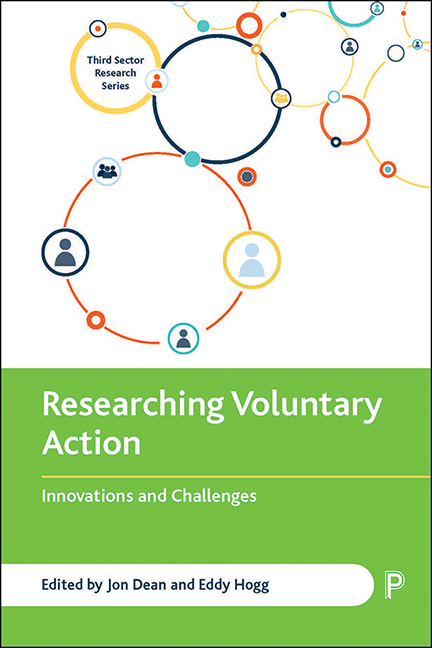Book contents
- Frontmatter
- Contents
- List of figures, tables and boxes
- Notes on contributors
- Acknowledgements
- Series editor’s foreword
- 1 Introduction
- 2 (Un)suitable methods and reflexive considerations: an interview and focus group study of youth volunteering
- 3 Interpretive ethnography: a UK charity shop case study
- 4 Collaborative philanthropy and doing practically relevant, critical research
- 5 Peer research: co-producing research within the context of voluntary and community action
- 6 Charity advertising: visual methods, images and elicitation
- 7 Using archives and objects in voluntary action research
- 8 Using Mass Observation as a source of qualitative secondary data for interdisciplinary longitudinal research on voluntary action
- 9 Investigating meanings and messages on volunteering through television media
- 10 Annual reporting in voluntary organisations: opportunities for content analysis research
- 11 Researching risk in the voluntary sector: the challenges and opportunities of regulatory data
- 12 Exploring the benefits of volunteering: combining survey and administrative data in the Nordic ‘laboratory’
- 13 Spatial approaches to the voluntary sector
- 14 Restudies, surveys and what counts as volunteering
- 15 Conclusion
- References
- Index
2 - (Un)suitable methods and reflexive considerations: an interview and focus group study of youth volunteering
Published online by Cambridge University Press: 15 September 2022
- Frontmatter
- Contents
- List of figures, tables and boxes
- Notes on contributors
- Acknowledgements
- Series editor’s foreword
- 1 Introduction
- 2 (Un)suitable methods and reflexive considerations: an interview and focus group study of youth volunteering
- 3 Interpretive ethnography: a UK charity shop case study
- 4 Collaborative philanthropy and doing practically relevant, critical research
- 5 Peer research: co-producing research within the context of voluntary and community action
- 6 Charity advertising: visual methods, images and elicitation
- 7 Using archives and objects in voluntary action research
- 8 Using Mass Observation as a source of qualitative secondary data for interdisciplinary longitudinal research on voluntary action
- 9 Investigating meanings and messages on volunteering through television media
- 10 Annual reporting in voluntary organisations: opportunities for content analysis research
- 11 Researching risk in the voluntary sector: the challenges and opportunities of regulatory data
- 12 Exploring the benefits of volunteering: combining survey and administrative data in the Nordic ‘laboratory’
- 13 Spatial approaches to the voluntary sector
- 14 Restudies, surveys and what counts as volunteering
- 15 Conclusion
- References
- Index
Summary
Introduction
The methodological reflections in this chapter are based on a qualitative study of youth volunteering in deprived urban areas in Glasgow, Scotland conducted during my doctorate (2013– 18). The research explored young people's understandings of volunteering, their routes to participation, the meanings they attributed to it and barriers to participation. Young volunteers and non-volunteers, aged 12– 18, were recruited to focus groups and interviews from youth organisations and educational institutions. Interviews were also conducted with youth workers. The focus of this chapter, however, is on the methodological issues encountered during fieldwork with young people. The chapter explores the role of gatekeepers, the negotiation of access and consent, recruitment challenges and the combined use of focus groups and interviews. It reflects on my attempt to use participatory methods during the pilot study and examines what ‘failed’ interviews can teach us about the research process. The chapter takes a reflexive approach and considers how, due to demographic differences and varying meanings attributed to volunteering, ‘outsider’ researchers can encounter challenges when studying voluntary action.
The research and I
Before discussing the methods, I want to provide an account of my positionality and route to the research. Qualitative methods are associated with a constructivist epistemology that views research as a process of meaning-making. Discussions between researchers and participants are shaped by the histories and biographies each brings to the encounter. Accordingly, my reflections on the methods I employed are contingent upon the interactions I had in the field and, without a brief biographical sketch, something may be lost in the following account.
I was born into a middle-class family in the south-east of England. My parents, who met while studying at university, relocated from the northwest a few years before I was born. I attended an independent day school that offered a variety of extra-curricular activities to ‘build character’ and enhance university applications – the assumption being that pupils would attend university. Aside from a brief stint in a charity shop one summer, I had little engagement with volunteering until I was an undergraduate, studying sociology at the University of Liverpool. While studying, I volunteered with a variety of groups, including adults with learning difficulties, deaf and blind children, asylum seekers and other students.
- Type
- Chapter
- Information
- Researching Voluntary ActionInnovations and Challenges, pp. 12 - 23Publisher: Bristol University PressPrint publication year: 2022



